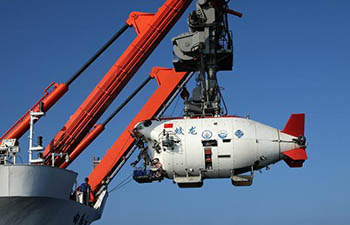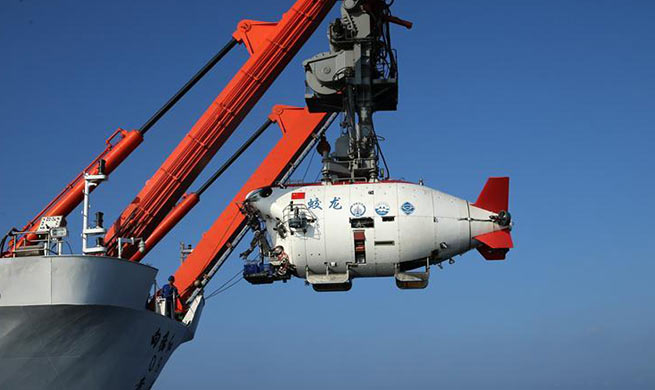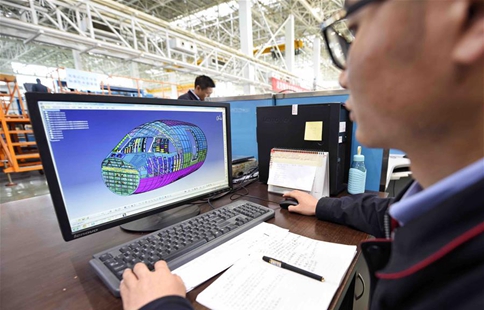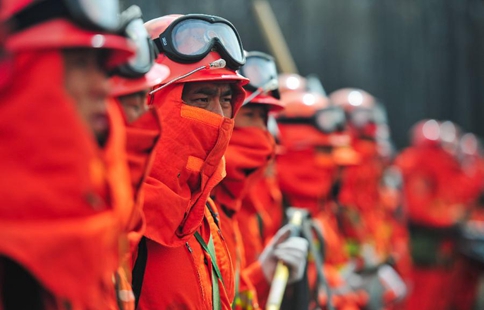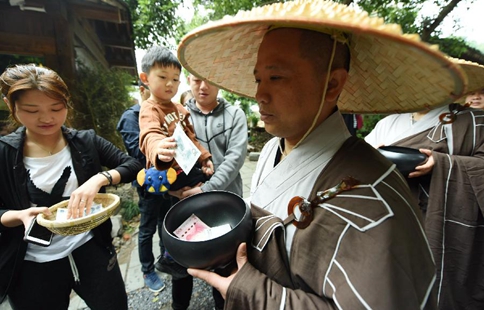
A woman holds a placard during a demonstration to protest against the revision of the pacifist Article 9 of the Japanese Constitution in Tokyo, Japan, April 11, 2015. Some 30 people participated in this protest. (Xinhua/Stringer)
TOKYO, May 6 (Xinhua) -- Japan's pacifistic Constitution has played an important role in the country's postwar development and to forcibly revise it will do no good to Japan, said Akira Ishii, a historian and professor emeritus of Tokyo University.
Japan's current Constitution, drawn up under the Allied occupation following World War II, is best known for its Article 9, by which Japan renounces its right to wage war and promises that "land, sea, and air forces, as well as other war potential, will never be maintained."
Ishii said the Constitution, time-tested in the past 70 years, has been well accepted by the Japanese people.
"Most people in Japan believe that the pacifistic Constitution have played a big role in the fast development of Japan after World War II," he said in a recent interview with Xinhua.
"The war-renouncing Constitution has also been the premise for Japan to be reaccepted into the international community after World War II," he added.
Revising the Constitution has long been a goal of Japanese Prime Minister Shinzo Abe and the ruling Liberal Democratic Party (LDP).
Ishii said that the LDP has been advocating constitutional revision as part of its platform since the party was founded in the 1950s, because it believes that the Constitution was imposed upon Japan by the United States.
As for the Abe administration, which has been keener on revising the Constitution than the previous governments, Ishii said that one of the reasons for Abe to push for constitutional revision is to secure support from the conservative forces in Japan.
He also pointed out that the Abe administration has been pushing for de facto Constitutional revision by changing constitutional interpretations. For example, Japan has forcibly enacted the controversial security laws to expand the role of the Self-Defense Forces overseas despite strong public oppositions.
He stressed that Japan's recent move of allowing the Imperial Rescript on Education in school textbooks is also unconstitutional as the prewar rescript preaches sacrificing one's life for the emperor.
According to Ishii, with Abe's ruling LDP and other forces in favor of revising the Constitution having a two-thirds majority in both chambers of the parliament now, revising the Constitution has become more realistic than ever.
However, Abe's attempts still face a lot of challenges, as to revise the Constitution needs the approval of a referendum while a lot of people in Japan oppose such revisions.
A recent poll by Japan's Kyodo News showed that 51 percent of respondents were against any constitutional amendments under the Abe administration, while 45 percent were in favor.
As the nation marked its 70th Constitution Memorial Day on Wednesday, some 55,000 people rallied in Tokyo to protest against Abe's attempts to amend the pacifist Constitution.
Another obstacle would be a possible split inside the pro-revision camp. For example, the LDP's coalition partner the Komeito Party hopes to retain the Article 9 while adding clauses on environment and privacy rights into the Constitution, said Ishii.
Ishii also expressed concerns that revising the war-renouncing Constitution would hurt Japan's relationship with its neighboring countries, which had fallen victim to Japan's invasion and brutalities before and during World War II.
"Japan's neighbors would have all kinds of guesses on what's behind Japan's move of revising the war-recouncing Constitution," he said.
"To revise the pacifist Constitution will meet a lot of challenges and to forcibly do it would do no good to Japan," he added.






